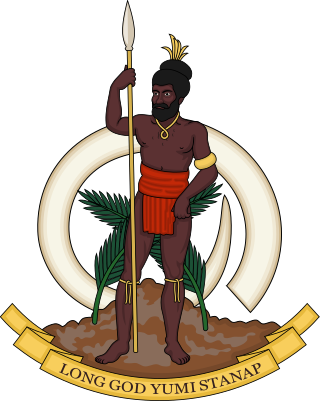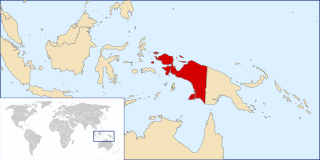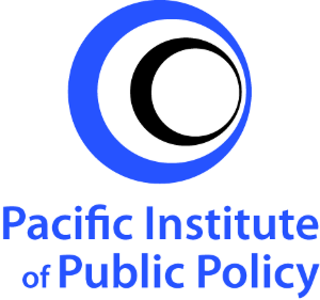
Papua New Guinea is a country in Oceania that comprises the eastern half of the island of New Guinea and its offshore islands in Melanesia. Officially the Independent State of Papua New Guinea, it shares its only land border with Indonesia to the west and it is directly adjacent to Australia to the south and the Solomon Islands to the east. Its capital, located along its southeastern coast, is Port Moresby. The country is the world's third largest island country, with an area of 462,840 km2 (178,700 sq mi).

Vanuatu maintains diplomatic relations with many countries, and it has a small network of diplomatic missions. Australia, France, Japan, New Zealand, the People's Republic of China, South Korea and the United Kingdom maintain embassies, High Commissions, or missions in Port Vila. The British High Commission maintained a continued presence for almost a century, though closed from 2005 until reopening in 2019.

Melanesia is a subregion of Oceania in the southwestern Pacific Ocean. It extends from New Guinea in the west to the Fiji Islands in the east, and includes the Arafura Sea.

Papua New Guinea's foreign policy reflects close ties with Australia and other traditional allies and cooperative relations with neighboring countries. Its views on international political and economic issues are generally moderate.

Pacific Islanders, Pasifika, Pasefika, Pacificans or rarely Pacificers are the peoples of the Pacific Islands. As an ethnic/racial term, it is used to describe the original peoples—inhabitants and diasporas—of any of the three major subregions of Oceania.

The Pacific Islands Forum (PIF) is an inter-governmental organization that aims to enhance cooperation between countries and territories of Oceania, including formation of a trade bloc and regional peacekeeping operations. It was founded in 1971 as the South Pacific Forum (SPF), and changed its name in 1999 to "Pacific Islands Forum", so as to be more inclusive of the Forum's Oceania-spanning membership of both north and south Pacific island countries, including Australia. It is a United Nations General Assembly observer.
From 1916 to 1975, Tuvalu was part of the Gilbert and Ellice Islands colony of the United Kingdom. A referendum was held in 1974 to determine whether the Gilbert Islands and Ellice Islands should each have their own administration. As a consequence of the referendum, the separate British colonies of Kiribati and Tuvalu were formed. Tuvalu became fully independent as a sovereign state within the Commonwealth on 1 October 1978. On 5 September 2000, Tuvalu became the 189th member of the United Nations.

The Fiji men's national football team is Fiji's national men's team and is controlled by the governing body of football in Fiji, the Fiji Football Association. The team plays most of their home games at the HFC Bank Stadium in Suva.

Melanesians are the predominant and indigenous inhabitants of Melanesia, in an area stretching from New Guinea to the Fiji Islands. Most speak one of the many languages of the Austronesian language family or one of the many unrelated families of Papuan languages. There are several creoles of the region, such as Tok Pisin, Hiri Motu, Solomon Islands Pijin, Bislama, and Papuan Malay.

The Republic of West Papua is a proposed country consisting of the Western New Guinea region, which is currently part of Indonesia in the continent of Oceania. The region has been part of Indonesia since 1 May 1963 under several names in the following order, West Irian, Irian Jaya, and Papua. Today the region comprises six Indonesian provinces: Papua, Central Papua, Highland Papua, South Papua, West Papua, and Southwest Papua.

Western New Guinea, also known as Papua, Indonesian New Guinea, Indonesian Papua, is the western, Indonesian half of the island of New Guinea. Since the island is alternatively named Papua, the region is also called West Papua.

The approximately 450 Oceanic languages are a branch of the Austronesian languages. The area occupied by speakers of these languages includes Polynesia, as well as much of Melanesia and Micronesia. Though covering a vast area, Oceanic languages are spoken by only two million people. The largest individual Oceanic languages are Eastern Fijian with over 600,000 speakers, and Samoan with an estimated 400,000 speakers. The Gilbertese (Kiribati), Tongan, Tahitian, Māori and Tolai languages each have over 100,000 speakers. The common ancestor which is reconstructed for this group of languages is called Proto-Oceanic.

The United Liberation Movement for West Papua (ULMWP) unites the three main political independence movements seeking independence for Western New Guinea from Indonesia under a single umbrella organisation. The ULMWP was formed on 7 December 2014 in Vanuatu uniting the Federal Republic of West Papua (NRFPB), the West Papua National Coalition for Liberation (WPNCL) and the National Parliament of West Papua (NPWP).

The Pacific Union is a proposed development of the Pacific Islands Forum, first suggested in 2003 by a committee of the Australian Senate, into a political and economic intergovernmental community. The union, if formed, would have a common charter, institutions and currency. Although John Howard, the former Prime Minister of Australia, spoke of a Pacific Union whilst in office, his government's emphasis was focused on bilateral relations and agreements with the individual states of the Forum.
The MSG Prime Minister's Cup, formerly known as Melanesia Cup, is an association football championship played between the Melanesian countries, it was used for qualification to the Oceania Nations Cup. The original tournament used a round-robin format involving every team playing each other once at the tournaments location.
This page details the match results and statistics of the Solomon Islands national football team from 2000 to present.
Jacob Rumbiak is a West Papuan academic and political leader who has been in self-imposed exile in Australia after escaping from detention as a political prisoner for ten years in Indonesian gaols. Rumbiak is the Foreign Affairs representative of the Federated Republic of West Papua declared at the conclusion of the Third Papuan People's Congress on 19 October 2011. Rumbiak's advice from within West Papua to not attend the Congress for security reasons was vindicated in the crack-down which led to six deaths, hundreds of arrests and the sentencing of five of the principal figures to three years gaol each for treason.
The Wantok Blong Yumi Bill was a bill unanimously adopted by the Parliament of Vanuatu in June 2010. It was derived from a "People’s Petition", tabled in Parliament by Independent MP Ralph Regenvanu.

The Pacific Institute of Public Policy (PiPP) is an independent, non-profit, regionally focused think tank based in Port Vila, Vanuatu. The stated aim of PiPP is to stimulate and support informed policy debate in the Pacific. A central feature of PiPP's model of engagement with policy stakeholders is the distribution of research via several media including: research syntheses, discussion papers, forums, public debates, social networking, audio and video podcasts, press, radio and television. PiPP was established on November 21, 2007, under the Vanuatu Charitable Associations (Incorporation) Act [CAP.140]. PiPP covers policy issues across the following Pacific Island Countries: Cook Islands, Federated States of Micronesia, Fiji, Kiribati, Marshall Islands, Nauru, Niue, Palau, Papua New Guinea, Samoa, Solomon Islands, Tonga, Tuvalu, Vanuatu

Indonesia–Solomon Islands relations refers to foreign relations between Indonesia and the Solomon Islands. Solomon Islands has opened their embassy in Jakarta since August 2014, while Indonesian embassy in Port Moresby is also accredited to Solomon Islands. Indonesia is a gateway for Pacific countries to enter the ASEAN and Asian region, while Indonesia wishes to increase its influence in Pacific region. Both countries are the members of Melanesian Spearhead Group (MSG).
















